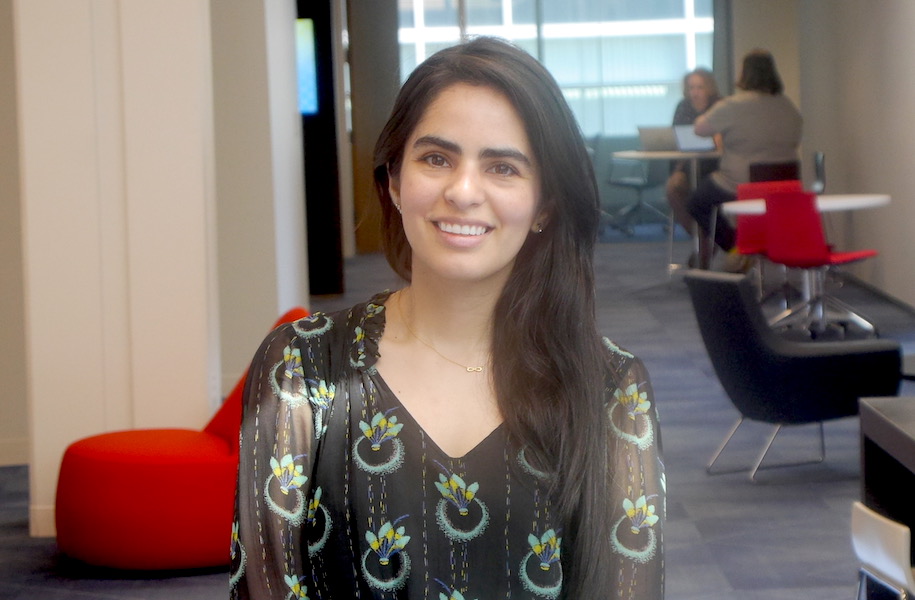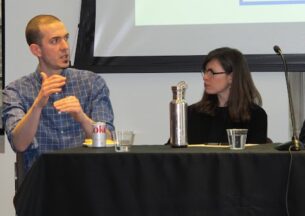PhD Student Yuliana Zamora Awarded National Physical Science Consortium Fellowship

Yuliana Zamora first gained hands-on appreciation for high-performance computing as a student at Cornell University, when she was tasked with installing servers in a local research cluster.
“A lot of people in supercomputing have this visual idea of what a node is and how their programs are parallelized among various nodes. My first experience required me to help setup, test, and benchmark these 70-pound nodes,” said Zamora, a 2nd-year Ph.D. student at UChicago CS. “By way of hands-on experience, I had this physical understanding of how these supercomputers were set up and learned how the hardware and software were interconnected.”
Today, Zamora continues to build that knowledge through research that combines HPC and systems, work that will now be supported through a fellowship from the National Physical Science Consortium. The fellowship, awarded to a small number of students each year, comes with up to six years of funding as well as mentoring and internship opportunities from a government or national laboratory sponsor.
At UChicago CS, Zamora works with co-advisors Ian Foster and Hank Hoffmann exploring how scientific applications will perform on new computer architectures, such as the hybrid CPU/GPU systems used in many state-of-the-art clusters and supercomputers. Her interest grew from her work with Derek Warner, Cornell Fracture Group Director, and further time spent at Los Alamos National Laboratory, where she worked with both computer scientists and domain experts from physics, oceanography, and applied math, porting and optimizing scientific applications to run on newly acquired architectures.
“I saw how HPC machines were used by people trying to find real-time solutions to problems with impact in the real world,” Zamora said, citing simulations of forest fire paths as one example. “I’m inspired by the expansive motivation behind the many users of HPC. These machines are not only used by CS people, but by people in medicine, biology, physics, math and more.”
Seeking a PhD program where she could continue this type of work, Zamora was attracted to the partnership between UChicago and Argonne National Laboratory, which shares CS faculty members such as Foster and Rick Stevens and provides access to resources such as the Argonne Leadership Computing Facility (ALCF). At Argonne, she is mentored by Venkat Vishwanath, Data Science Group Lead at ALCF.
“I came here because I already had the HPC systems background, and I wanted to absorb that analytical math background that UChicago is known for,” Zamora said. “I really like the close connection UChicago has with Argonne, allowing for many opportunities to contribute to larger projects. I also don't have a tiny cluster that I have to work on. I can work on machines with thousands of nodes and the latest hardware.”
In her choice of co-advisors Foster and Hoffmann, Zamora has also created a new lane of research within the department, both said.
“I met Yulie at an event at the SC [supercomputing] conference, and was impressed with her enthusiasm for, and knowledge of, HPC,” Foster said. “I encouraged her to apply to UChicago, and I’m delighted that she joined us. Now she is driving new connections within CS, due to her desire to work at the interface between power-aware computing, machine learning, and cutting-edge computer architectures.”
“Yulie’s unique take is using data science and machine learning to better understand HPC, which is a clever twist on the common problem of using HPC to drive data science,” Hoffmann said. “Her work has the potential to greatly improve HPC energy efficiency while reducing the time and cost of evaluating emerging architectures for new HPC acquisition.”
Zamora spends her summers combining research at ALCF with another passion — computer science outreach. Last year, she developed an introductory computer science course for the university’s Chicago Academic Achievement Program (CAAP), which helps prepare incoming first-year students.
“Last summer was one of my favorite quarters here,” Zamora said. “Every day I was either going to Argonne and doing research or coming here and teaching. There's a very strong outreach here at UChicago; a lot of people identify the unique opportunities given to them, and are eager to give back to the community. I want to help others that might not have been as lucky as I was.”












